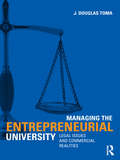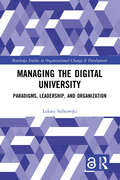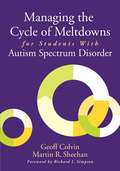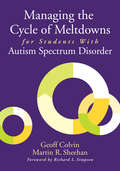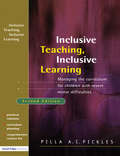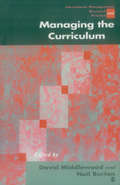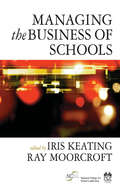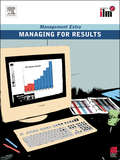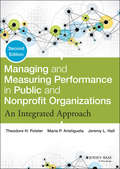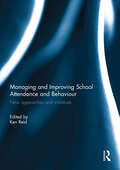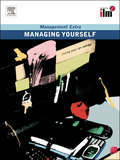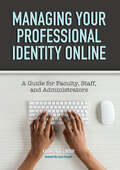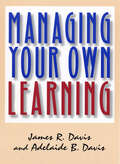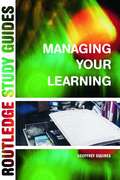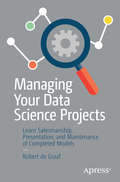- Table View
- List View
Managing the Entrepreneurial University: Legal Issues and Commercial Realities
by J. Douglas TomaManaging the Entrepreneurial University is essential reading for both higher education administrators and those studying to enter the field. As universities have become more market focused, they have changed dramatically. But has the law kept up? This book explains fundamental legal concepts in clear, non-technical language and grounds them in practical management situations, indicating where doctrines and standards have evolved, identifying where legal difficulties may be more likely to arise, and suggesting where change may be merited. In its chapters on process, discrimination, employment, students, and regulation, the book: Provides lively case studies applicable to every type of institution Includes a simulation exercise at the end of each chapter for use in teaching or training Draws on an over 550-source bibliography A hypothetical case spans each chapter, addressing not only research universities and elite liberal arts colleges, but also community colleges, small private colleges, and regional comprehensive universities. Readers working across functional areas and at various institution types will find the book directly relevant in clarifying and deepening their understanding of the legal environment associated with their responsibilities within the entrepreneurial university.
Managing the Digital University: Paradigms, Leadership, and Organization (Routledge Open Business and Economics)
by Łukasz SułkowskiThe reflection on university management is based on the question about the shape of universities of the future. Civic, responsible, sustainable, virtual, digital, and many other universities can be mentioned among the concepts present in the literature. All these names describe an important distinctive feature of a university, which will gain more and more importance in the future. However, given the fundamental importance of the radical change taking place, it seems that the most appropriate name, reflecting the essence of the emerging new formation, is "digital university." This is because of the importance of digital transformation, which has been developing for several decades, bringing deep and multidirectional changes in the areas of technology, economy, society, and culture. It is a disruptive civilizational transition and, although stretched over many decades, it is revolutionary in nature, significantly changing our lives in the Anthropocene. The book has three cognitive and pragmatic objectives: to provide a new perspective on the changing academic organization and management; to reflect on higher education management concepts and methods; and to present an overview of university management, governance, and leadership, useful from the perspective of academic managers, and other stakeholders. The Open Access version of this book, available at www.taylorfrancis. com, has been made available under a Creative Commons Attribution-Non Commercial-No Derivatives 4.0 license.
Managing the Cycle of Meltdowns for Students with Autism Spectrum Disorder
by Geoff Colvin Martin R. SheehanBased on Geoff Colvin's bestselling book, Managing the Cycle of Acting-Out Behavior in the Classroom, this practitioner-friendly guide provides special and general education teachers of autistic students with a six-phase positive behavior support model that includes interventions for each phase. Outlining practical steps for preventing and responding to the various phases of meltdown behavior in students with autism spectrum disorder, you'll find: An overview of ASD Examples of meltdown behavior Common triggers Addressing sensory issues Establishing expectations and rules Collaborating with parents And much moreTeachers will find experienced guidance for providing a supportive environment in which students with ASD can succeed.
Managing the Cycle of Meltdowns for Students With Autism Spectrum Disorder
by Martin R. Sheehan Geoffrey T. ColvinHow to keep meltdowns from overheating your classroom This book outlines practical steps for preventing and responding to the various phases of meltdown behavior in students with ASD. Based on Geoff Colvin’s best-selling book, Managing the Cycle of Acting Out Behavior in the Classroom, this practitioner-friendly guide provides special and general education teachers with his seven-phase positive behavior support model that includes interventions for each phase. Readers will also find: An overview of the nature of autism and meltdown phases Case studies with examples of behaviors and plans A chapter on parent communication Prevention techniques for the early stages of the cycle
Managing the Cycle of Acting-Out Behavior in the Classroom
by Terrance M. Scott Geoffrey T. ColvinMinimize problem behavior and maximize student success! Acting-out behavior by students manifests in ways that make classroom management and teaching very challenging. Building on a model using seven phases of acting-out behavior presented in the first edition, the newly updated edition draws on new research in applied behavior analysis, sound instructional principles, and functional behavior assessment to deliver a clear roadmap for educators to design interventions in a clear, systematic, and achievable matter. Features include: Managing each phase of the acting-out cycle—from structuring the classroom, to handling escalated behavior, to recovery Case studies that distill concrete action steps from the book’s concepts Checklists, tools, resources, and templates for applying the book’s principles to any classroom
Managing the Cycle of Acting-Out Behavior in the Classroom
by Terrance M. Scott Geoffrey T. ColvinMinimize problem behavior and maximize student success! Acting-out behavior by students manifests in ways that make classroom management and teaching very challenging. Building on a model using seven phases of acting-out behavior presented in the first edition, the newly updated edition draws on new research in applied behavior analysis, sound instructional principles, and functional behavior assessment to deliver a clear roadmap for educators to design interventions in a clear, systematic, and achievable matter. Features include: Managing each phase of the acting-out cycle—from structuring the classroom, to handling escalated behavior, to recovery Case studies that distill concrete action steps from the book’s concepts Checklists, tools, resources, and templates for applying the book’s principles to any classroom
Managing the Curriculum for Children with Severe Motor Difficulties: A Practical Approach
by Pilla PicklesThis is a practical and imaginative guide to the management and education of children with severe motor difficulties. It is particularly useful for mainstream schools and also special schools and children at home.
Managing the Curriculum (Centre for Educational Leadership and Management #7)
by David Middlewood Neil Burton`Each chapter in the book is firmly rooted in research and is well referenced as one would expect of such a book. It will be of particular use to people with an academic interest in this aspect of school management but will also be thought-provoking for those who are involved in the development of the curriculum within their institution′ - escalate This book explores many of the new aspects of the core business of schools and colleges, that is, the curriculum. Keeping the focus clearly on learning and teaching, the contributors explore the practical issues for managers at institutional level, within the context of their need to understand and analyze key educational values and principles. Part One presents overviews of theories and models of curriculum, while Part Two examines how these are applied through planning, monitoring and evaluating. Part Three explores in detail the various managerial roles within schools and colleges from leaders to those responsible for cross-curriculum work and special educational needs. The fourth part discusses the importance of effectively managing resources for the curriculum - the environment, support staff and finance. Contributors use empirical research evidence to analyze current curriculum trends whilst proposing various new models which are likely to emerge in the 21st century.
Managing the Business of Schools
by Dr Iris Keating Dr Ray MoorcroftWritten by experienced consultants, this book explores the key themes surrounding the role of the School Business Manager, and offers guidance for dealing with the practical issues of the job. Experts in the field provide practical advice on the essential technical aspects of the role, such as managing risk, managing facilities and human resources, and the book also considers strategic issues and addresses "big questions" such as the workforce remodelling agenda and extended schools. Each chapter contains a useful summary of key points, case studies, and suggested further reading for continued study. Senior Management Team members, school governors, school business managers, students of school business management and anyone involved in and interested in the effective management of schools will find this book an invaluable source of reference.
Managing for Results Revised Edition: Revised Edition (Management Extra Ser.)
by ElearnStuck for ideas, inspiration or just want to work differently? Management Extra brings all the best management thinking together in one package. The books are practical and well structured to provide an in depth treatment of these management topics. Titles in the series: * Business Environment * Change Management * Development for High Performance * Effective Communications * Financial Management * Information and Knowledge Management * Leadership and Management in Organisations * Leading Teams * Making Sense of Data and Information * Managing Markets and Customers * Managing for Results * Managing Health, Safety and Working Environment * Managing Legal and Ethical Principles * Managing Yourself * Positive Working Relationships * Project Management * Quality and Operations Management * Reaching Your Goals Through Innovation * Recruitment and Selection * Reputation Management The series fuses key theories and concepts with applied activities to help managers examine how they work in practice. The books are created with individuals in mind. They are designed to help you improve your management skills. Management Extra can also be used in conjunction with management programmes of study aligned to standards. Each of the books has case studies, self assessments and activities all underpinned by knowledge and understanding of the frameworks and techniques required to improve performance. Management Extra provides managers and trainers with a handbook for action and development. "You found it – what a find! A practical resource packed with all the relevant theory and suggested activities to support your professional development. An essential resource to have at your fingertips, jump in and enjoy."--Russell Jeans, Learning and Development Manager, ntl "All the essential concepts are here, presented in an easily digestible format with lots of up to date case studies and references – but, most importantly, with plenty of thought provoking activities and self-diagnostic exercises to make the learning personal and transferable."--Peter Manning, Head of Training & Development, News International Newspapers Ltd
Managing and Measuring Performance in Public and Nonprofit Organizations
by Theodore H. Poister Jeremy L. Hall Maria P. AristiguetaNew edition of a classic guide to ensuring effective organizational performanceThoroughly revised and updated, the second edition of Managing and Measuring Performance in Public and Nonprofit Organizations is a comprehensive resource for designing and implementing effective performance management and measurement systems in public and nonprofit organizations. The ideas, tools, and processes in this vital resource are designed to help organizations develop measurement systems to support such effective management approaches as strategic management, results-based budgeting, performance management, process improvement, performance contracting, and much more.The book will help readers identify outcomes and other performance criteria to be measured, tie measures to goals and objectives, define and evaluate the worth of desired performance measures, and analyze, process, report, and utilize data effectively.Includes significant updates that offer a more integrated approach to performance management and measurementOffers a detailed framework and instructions for developing and implementing performance management systemsShows how to apply the most effective performance management principlesReveals how to overcome the barriers to effective performance managementManaging and Measuring Performance in Public and Nonprofit Organizations identifies common methodological and managerial problems that often confront managers in developing performance measurement systems, and presents a number of targeted strategies for the successful implementation of such systems in public and nonprofit organizations. This must-have resource will help leaders reach their organizational goals and objectives.
Managing and Improving School Attendance and Behaviour: New Approaches and Initiatives
by Ken ReidThis new book on school attendance and behaviour brings an international flavour to the field, with contributions on some of the latest empirical research and thinking from around the world. It includes contributions from Canada and the USA, Hong Kong, Europe, the United Kingdom and Ireland. Some of the interesting, wide-ranging, and often unique topics covered in the book include: truancy and well-being, disaffection, pupil absenteeism, social mediation, aggression in primary schools, bullying, emotional barriers to learning, behaviour management training, exclusion, reintegration, the role of educational psychologists, and ethnic diversity and classroom disruption in the context of migration policies.The book should prove both helpful and useful for a wide range of professionals, students, and academics, across a wide range of educational, care, and social policy disciplines. This book was originally published as a special issue of Educational Studies.
Managing Yourself Revised Edition: Revised Edition (Management Extra Ser.)
by ElearnStuck for ideas, inspiration or just want to work differently? Management Extra brings all the best management thinking together in one package. The books are practical and well structured to provide an in depth treatment of these management topics. Titles in the series: * Business Environment * Change Management * Development for High Performance * Effective Communications * Financial Management * Information and Knowledge Management * Leadership and Management in Organisations * Leading Teams * Making Sense of Data and Information * Managing Markets and Customers * Managing for Results * Managing Health, Safety and Working Environment * Managing Legal and Ethical Principles * Managing Yourself * Positive Working Relationships * Project Management * Quality and Operations Management * Reaching Your Goals Through Innovation * Recruitment and Selection * Reputation Management The series fuses key theories and concepts with applied activities to help managers examine how they work in practice. The books are created with individuals in mind. They are designed to help you improve your management skills. Management Extra can also be used in conjunction with management programmes of study aligned to standards. Each of the books has case studies, self assessments and activities all underpinned by knowledge and understanding of the frameworks and techniques required to improve performance. Management Extra provides managers and trainers with a handbook for action and development. "You found it – what a find! A practical resource packed with all the relevant theory and suggested activities to support your professional development. An essential resource to have at your fingertips, jump in and enjoy."--Russell Jeans, Learning and Development Manager, ntl "All the essential concepts are here, presented in an easily digestible format with lots of up to date case studies and references – but, most importantly, with plenty of thought provoking activities and self-diagnostic exercises to make the learning personal and transferable."--Peter Manning, Head of Training & Development, News International Newspapers Ltd
Managing Your Professional Identity Online: A Guide for Faculty, Staff, and Administrators
by Kathryn E. LinderIn higher education, professional online identities have become increasingly important. A rightly worded tweet can cause an academic blog post to go viral. A wrongly worded tweet can get a professor fired. Regular news items in The Chronicle of Higher Education and Inside Higher Ed provide evidence that reputations are both built and crushed via online platforms. Ironically, given the importance of digital identities to job searches, the promotion and distribution of scholarly work, pedagogical innovation, and many other components of an academic life, higher education professionals receive little to no training about how to best represent themselves in a digital space.Managing Your Professional Identity Online: A Guide for Higher Education fills this gap by offering higher education professionals the information and guidance they need to:- craft strong online biographical statements for a range of platforms;- prioritize where and how they want to represent themselves online in a professional capacity;- intentionally and purposefully create an effective brand for their professional identity online;- develop online profiles that are consistent, professional, accurate, organized, of good quality, and representative of their academic lives;- regularly update and maintain an online presence;- post appropriately in a range of online platforms and environments; and- successfully promote their professional accomplishments.Managing Your Professional Identity Online is practical and action-oriented. In addition to offering a range of case studies demonstrating concrete examples of effective practices, the book is built around activities, templates, worksheets, rubrics, and bonus materials that walk readers through a step-by-step guide of how to design, build, and maintain professional online identities.
Managing Your Own Learning
by James R. Davis Adelaide B. DavisDescribes seven major ways of learning and shows how each can best be used to maximize self-directed learning Provides a step-by-step guide to assessing previous learning and designing an action plan for future learning Reveals how to expand opportunities for learning and use libraries and the Internet more effectively As the pace of change in the workplace continues to accelerate, individuals are under more pressure to learn new things than ever before. While most people realize they have more to learn, many have trouble translating that anxious need into purposeful action. Managing Your Own Learning demonstrates how to analyze previous learning, design an action plan for future learning, expand opportunities for learning, and use libraries and the Internet effectively to become a lifelong learner. James and Adelaide Davis detail seven major ways of learning: learning new skills, learning from presentations, learning to think, learning to solve problems and make decisions, learning in groups, learning through virtual realities, and learning from experience. They also provide useful guidelines for maximizing results by becoming an effective, active participant in learning. They explain, for example, how learning in a group can be enhanced by knowing how a group works and considering factors such as group size, cohesion, task and process behavior, and participant roles, as well as the things that can go wrong in groups, such as conflict and apathy. For each of the seven ways of learning, the authors tell what is unique about it, how learning actually takes place, and how it can be augmented in each situation. They reveal how the theory behind each way of learning originated, what researchers have learned about it, and what the individual's role is as a participant. And at the end of each chapter, they include a list of ten things that anyone can do to get the most from that particular type of learning. No matter what our previous experiences with learning may have been, we all must become self-directed learners if we are to succeed in this new era. Managing Your Own Learning provides step-by-step, proven advice on how to succeed in the 21st century workplace by becoming a proactive, goal-directed, perpetual learner.
Managing Your Moods (Women of Faith Study Guide Series)
by Thomas NelsonFilling the needs of today's women, we offer the next 4 titles in the best-selling Women of Faith series.These topical guides deal with issues that women wrestle with today, such as friendship, encouragement, managing moods, finding contentment, and how to live out your faith. Reaching an audience across racial, socio-economic, denominational, and age boundaries, these guides will enhance the lives of women as they empower them in their weekly devotions. The study guides can be used for both individual and group settings. Women are asking good questions about their faith. With our study guides, we want to join them in their quest for knowledge and lead them in finding the answers they are seeking. The Study Guide Series will include the following:#5 Managing Your Moods - Foreword by Marilyn Meberg ISBN: 0-7852-5151-0#6 Cultivating Contentment - Foreword by Luci Swindoll ISBN: 0-7852-5152-9#7 Encouraging One Another - Foreword by Nicole Johnson ISBN: 0-7852-5153-7#8 A Life of Worship - Foreword by Sheila Walsh ISBN: 0-7852-5154-5
Managing Your Learning (Routledge Study Guide Ser.)
by Geoffrey SquiresThis book is about analysing, understanding and managing the way you learn. Whether you are working towards a formal qualification, are undertaking work-related training or are learning informally by yourself, Managing Your Learning will help you to assess and build on your strengths, and identify and improve your weaknesses.You can use this book by yourself or in an organised group or class. There are 25 sections, each containing:*a diagnostic questionnaire on a specific aspect of learning*key points to explore*suggestions for further actionEach chapter has sections for you to make notes about your own situation, and there is advice on computers, presentations and other study skills. By the end of the book, you will have developed an individual learning profile and worked out a personal action plan.
Managing Your Emotions (Women of Faith Study Guide Series)
by Women Of FaithMost of us live at the mercy of our emotions. When we’re up we’re happy, content, and joyful, but when we’re down we’re depressed, angry, and frustrated. What’s more, we often have mixed emotions, conflicting emotions, or fleeting emotions. All of this leaves us feeling at war with ourselves. In this study, readers will discover that there is hope! While we can’t necessary control what we feel, we can manage how we react to those emotions. We can lean into the feelings that God has given each of us, explore what God says about them in His Word, and learn God’s perspective on how to manage them. When we do, we will find that our emotions can be our allies!
Managing Your Emotions (Renew & Restore Bible Studies)
by ZondervanGod designed us to have emotions, but he doesn&’t want us to be controlled by them! In this Bible study, readers will learn how to master their emotions and achieve inner peace.We all have emotional ups and downs—they&’re part of everyday life. But some days, our feelings can seem out of control. We find ourselves reacting to everything that lands in front of us. We live at the mercy of our emotions, and we feel like we just can&’t help it.But it doesn&’t have to be this way.We can&’t control what we feel, but we can manage how we react to those emotions. We can take the time to understand the feelings that God has given us, explore what God says about them in His Word, and learn His techniques for how to manage them. When we do, it becomes easier to set down the things that are troubling us and make room for joy in our lives.Perfect for personal reflection or small groups, this Bible study will help you detach from the emotions that shape your day and cultivate the attitude you want.
Managing Your Data Science Projects: Learn Salesmanship, Presentation, and Maintenance of Completed Models
by Robert de GraafAt first glance, the skills required to work in the data science field appear to be self-explanatory. Do not be fooled. Impactful data science demands an interdisciplinary knowledge of business philosophy, project management, salesmanship, presentation, and more. In Managing Your Data Science Projects, author Robert de Graaf explores important concepts that are frequently overlooked in much of the instructional literature that is available to data scientists new to the field. If your completed models are to be used and maintained most effectively, you must be able to present and sell them within your organization in a compelling way.The value of data science within an organization cannot be overstated. Thus, it is vital that strategies and communication between teams are dexterously managed. Three main ways that data science strategy is used in a company is to research its customers, assess risk analytics, and log operational measurements. These all require different managerial instincts, backgrounds, and experiences, and de Graaf cogently breaks down the unique reasons behind each. They must align seamlessly to eventually be adopted as dynamic models.Data science is a relatively new discipline, and as such, internal processes for it are not as well-developed within an operational business as others. With Managing Your Data Science Projects, you will learn how to create products that solve important problems for your customers and ensure that the initial success is sustained throughout the product’s intended life. Your users will trust you and your models, and most importantly, you will be a more well-rounded and effectual data scientist throughout your career.Who This Book Is ForEarly-career data scientists, managers of data scientists, and those interested in entering the field of data science
Managing Your Boss In A Week: Managing Up In Seven Simple Steps (Teach Yourself In A Week Ser.)
by Sandi MannThe ability to work successfully with your line manager is vital to anyone who wants to advance their career.Written by Sandi Mann, a leading expert on managing upwards as both a coach and a practitioner, this book quickly teaches you the insider secrets you need to know to in order to form a successful relationship with your boss.The highly motivational 'in a week' structure of the book provides seven straightforward chapters explaining the key points, and at the end there are optional questions to ensure you have taken it all in. There are also cartoons and diagrams throughout, to help make this book a more enjoyable and effective learning experience.So what are you waiting for? Let this book put you on the fast track to success!
Managing Your Boss In A Week: Managing Up In Seven Simple Steps (Teach Yourself In A Week Ser.)
by Sandi MannManaging your boss just got easierHaving a good working relationship with the person in charge is crucial to enjoying a positive and fulfilling work life. All of the problems created by difficult relationships can be avoided, in many cases, by simply learning the skills to successfully 'manage' your boss. Most of us think that it is the other way around - that the boss manages us - but the astute employee knows that it works both ways.If you understand how your boss operates, the inner working of their brain and their personality, you are far better able to meet their needs as an employee. And an employee who meets the needs and expectations of their boss will be a popular employee indeed!This book guides you through the process of managing your boss so as to ensure that you are ideally placed to become their favourite employee. Whether you choose to read it in a week or in a single sitting, this is your fastest route to success:- Sunday: What kind of animal is the 'boss'?- Monday: What type of boss do you have?- Tuesday: Using the psychological contract to manage your boss- Wednesday: How to impress your boss- Thursday: Getting more from your boss- Friday: Dealing with the boss from hell- Saturday: Common problems with managing the boss
Managing Your Academic Research Project
by Jacqui Ewart Kate AmesThis book is an essential resource for academics managing a large and complex research project. It provides important practical insights into the processes that inform such research projects and delivers insights into the delicate balance between industry, stakeholder and academic needs. It gives practical advice about developing relationships with diverse partners and colleagues and managing the expectations of the various parties involved and on avoiding pitfalls. This book uses examples from Australian research projects, but it contains insights relevant to researchers all around the world.
Managing Your Academic Career: A Guide to Re-Envision Mid-Career
by Vicki L. BakerThe definitive resource for mid-career professionals in the academy, this book provides a step-by-step guide to re-imagining the mid-career stage, regardless of career goals, whether aiming for full professorship or an administrative path, drawing on higher education, organizational studies, and human resource fields. Essential guidance for scholars of faculty work, faculty developers, mid-career faculty members, and institutional leaders to build a strong foundation to design a diversified portfolio of mid-career stage programming is assured. The stories, examples, literature, and resources shared throughout this comprehensive work will provide inspiration, and reality checks, to mid-career faculty and the individuals charged with better supporting them. Readers will be able to: Identify their career (or departmental/institutional) goals and next steps Determine the gaps in needed skills, tools, and experiences to support goal achievement as next steps are pursued Manage the process of taking newfound skills, tools, strategies, and resources to arrive at the intended destination. Higher education faculty, administrators, and other academic leaders will be empowered to take control of the mid-career stage by using the resources, strategies, and tools offered throughout the book to build, implement, and assess a robust mid-career faculty development program.
Managing Violence in Schools: A Whole-School Approach to Best Practice
by Dawn Jennifer Helen CowieThis timely text, written by experts in research, practice and training in the field, proposes a whole-school community approach to the reduction and prevention of school violence. Underpinned by recent research findings, the book is illustrated throughout with case studies, examples of good practice in action, ideas and resources including exercises, activities and checklists. The book covers: - personal characteristics of perpetrators, victims and bystanders - role of the family - ethos and culture of the school - quality of interpersonal relationships at school - quality of the learning environment of the school - links between school and community The authors' approach aims to promote non-violence , improve the climate of the school, enhance relationships among staff, pupils and parents, and to support the emotional health and well-being of all members of the school community. Strategies include preventative methods, provision for the individual needs of pupils and peer support, emotional literacy and restorative practice. The authors also provide guidance on how to create a shared understanding of school violence, how to prepare for change and how to carry out an effective needs analysis in order to successfully address the issue. This book is essential for practitioners, students in education and school management as well as local educational advisors.
